A film production house owned by Karnataka minister Munirathna has launched a movie portraying two mythical Vokkaliga chieftains as the “real killers” of Tipu Sultan, pursuing the Sangh parivar claim that the 18th-century Mysore ruler did not die fighting the British colonialists.
Vrushabhadri Productions have registered the name of the film as Uri Gowda Nanje Gowda, after the two Vokkaliga chieftains, who historians say are a figment of the Sangh parivar’s imagination.
Established history says Tipu was killed on May 4, 1799, in the fourth Anglo-Mysore War while defending his fort in his capital of Srirangapatna near Mysore.
The move to make the film, and the attendant publicity, comes with just weeks to go before the Assembly elections in Karnataka.
The BJP has been straining every muscle to win over the Vokkaliga community, which accounts for 11 per cent of the state’s 5 crore voters and wields decisive influence in the Old Mysore region.
Traditionally, the Vokkaligas have backed the Janata Dal Secular of former Prime Minister H.D. Deve Gowda, who belongs to the community.
Tipu has been a subject of bitter political controversy in Karnataka, with the Congress and the JDS portraying him as a progressive ruler and the Sangh parivar dubbing him a tormentor of Hindus.
Talakadu Chikkarange Gowda, a historian who has done extensive research on Tipu, denied the Hindutva portrayal of Tipu’s life and death.
“British officers have chronicled Tipu’s last hours from the moment he heads to defend his fort that was under attack. Tipu was having lunch when he was informed about the attack on his fort, located near his palace,” he told The Telegraph on Saturday.
“The British chronicled everything that happened after that, how the battle ensued, how Tipu was shot at near the Watergate and his body was found some 100 yards away inside the fort, how more than 50,000 people participated in the procession (on May 5, 1799) that took the body for burial. But these two characters (his alleged Vokkaliga killers) do not figure anywhere.”
Chikkarange Gowda asked: “Why did 50,000 people, the majority of them Hindus, attend Tipu’s funeral if he was anti-Hindu? Why are the majority of those who attend his annual urus (commemorative procession in Mysore) Hindus?”
Architect Mansoor Ali, who has been voicing concern at the neglect of monuments related to Tipu and his father Hyder Ali, echoed Chikkarange Gowda.
“They have suddenly projected these two characters to divide the Vokkaliga votes ahead of the elections,” he told this newspaper.
Deve Gowda’s son and former chief minister H.D. Kumaraswamy accused the BJP of “maligning the Vokkaliga community as a whole with this fiction that two Vokkaliga chieftains killed Tipu”.
“Their intention is to make Vokkaligas permanent villains in history,” he told reporters on Friday.
Union minister Shobha Karandlaje, who was last week appointed head of the BJP’s election management committee, claimed the two Vokkaliga chieftains were historical figures.
“They fought for self-respect because Tipu and his father Hyder Ali had betrayed the Mysore maharajas,” she said.
Hyder Ali, a soldier elevated by Mysore’s Wodeyar rulers as their army chief, eventually took control of the kingdom before Tipu assumed the crown in 1782.
The reference to the two Vokkaliga chieftains appears to be of recent origin. A controversial Kannada play, Tipu Nijakanasugalu (The Real Dreams of Tipu), written by Addanda Cariappa a few years ago, mentions Uri Gowda and Nanje Gowda as the real killers of Tipu.











